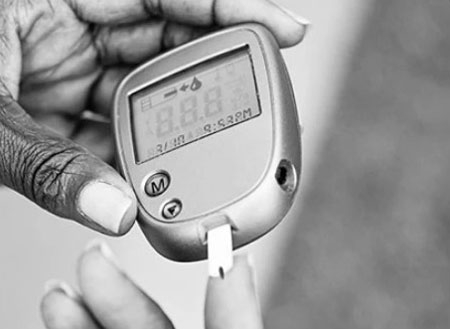American medicine is broken into a variety of specialties allowing the patient to get the most experienced and knowledgeable care. Orthopaedics is our bread and butter, but all specialties must work together to provide effective and comprehensive medical care for patients. Our board-certified physicians often coordinate with other specialties to better diagnose, treat, and manage pathologies. The reality is that everything in the body can affect everything else. Simply treating knee arthritis may not be the best approach for a patient if other comorbidities exist and are ignored.
One of the comorbidities that greatly affects how we are able to treat our patients is diabetes. Type 2 diabetes is a lifestyle disease that causes high blood sugar due to the body’s insufficient insulin production. It can be controlled with diet and exercise if a patient is willing to make lifestyle changes. Otherwise, medication is prescribed to help control blood sugars to a manageable level. Though diabetes itself is outside our realm, it affects so much of what we do. For example, the cortisone injections we often provide, can raise blood sugars. If diabetes goes uncontrolled, patients could find themselves with dangerously high levels after a routine injection. Some patients schedule separate appointments to have both of their knees injected with cortisone because of how it affects their sugars, which is certainly something we are happy to accommodate, but it does cause the patient some inconvenience.
Diabetes can also cause neuropathy in the extremities, which results in numbness, tingling, and general lack of sensation. These symptoms can complicate the process of identifying musculoskeletal pathology due to the altered sensation the patient experiences. It is not uncommon to have injuries go unnoticed due to the lack of feeling. Wound issues are common for diabetics as well. Often, healing is delayed, which can greatly complicate surgical intervention should you ever require or elect to pursue it.
Type 2 diabetics often struggle with weight maintenance as well. In the world of orthopaedics, we are often preaching about the importance of maintaining one’s ideal body weight. A healthy body mass index limits the amount of stress on your joints and makes rehabilitating injuries a much easier process. Ultimately, an excessively high body weight will prevent you from pursuing a joint replacement should you ever desire one. This blog is not meant to scorn or scold, but rather to provide encouragement to be your healthiest self. We strive to get our patients back to active lifestyles, but our ability to do so can be greatly hindered by comorbidities such as diabetes. Help us help you by fueling your body with nutrient-rich foods, enjoying alcohol in moderation, getting regular exercise, and effectively managing stress-your musculoskeletal system will thank you!

